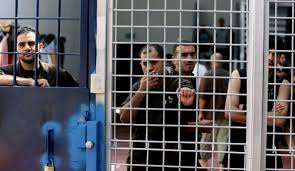Martyrdom of Prisoner Inside Israeli Jails raises number of martyred detainees to 81 since genocide start
The General Authority of Civil Affairs in Palestine informed both the Commission of Detainees and Ex-Detainees Affairs and the Palestinian Prisoners’ Club on Sunday of the martyrdom of prisoner Mohammed Hussein Mohammed Ghawadra (63) from Jenin in the occupied West Bank, bringing the number of martyred detainees since the start of the genocide to 81.
The Israeli occupation had arrested Ghawadra on August 6, 2024, and he had since been held in “Janot” Prison (formerly Nafha and Ramon). He is the father of administrative detainee Sami Ghawadra and of Shadi Ghawadra, a freed prisoner deported to Egypt as part of the prisoner exchange deal carried out earlier this year.
The Commission and the Prisoners’ Club confirmed that the martyrdom of Mohammed Ghawadra comes amid continued systematic incitement led by the Israeli occupation authorities, represented by fascist war criminal Minister Itamar Ben-Gvir, who seeks to pass a law permitting the execution of prisoners and openly boasts about his crimes against them, while Palestinian detainees are subjected to the harshest forms of ongoing genocide inside Israeli prisons.
They added that the killing of Ghawadra is part of a series of systematic crimes carried out by the Israeli prison system against detainees, aiming to kill them slowly and destroy them both psychologically and physically.
The two institutions noted that following the ceasefire agreement in Gaza, the Israeli Prison Administration escalated its crimes and violations. Testimonies from freed detainees have provided irrefutable evidence of compound torture crimes and field executions inside prisons, which were clearly reflected in the condition of the bodies of the martyrs handed over as part of the agreement.
With the martyrdom of Mohammed Ghawadra, the number of martyred detainees since the start of the genocide has risen to 81 whose identities have been confirmed, amid the ongoing crime of enforced disappearance affecting dozens of other prisoners.
They pointed out that this phase in the history of the prisoners’ movement is the bloodiest since 1967, with 318 identified martyrs documented since that year, according to prisoner institution data.
They also reported that the number of prisoners whose bodies are still held by the Israeli occupation, both before and after the war, has risen to 89, including 78 since the start of the war.
The two institutions stressed that the unprecedented pace of detainee martyrdom proves that the Israeli prison system continues to implement a policy of slow execution, with hardly a month passing without a new martyr emerging from among the detainees.
They explained that, given the ongoing daily crimes inside prisons, the number of martyrs is expected to rise, as thousands of detainees are held in conditions lacking the most basic elements of life and subjected to systematic violations.
These violations include torture, starvation, physical and sexual assaults, medical neglect, and the spread of infectious diseases, most notably scabies, which has resurfaced among detainees, alongside unprecedented levels of deprivation and abuse.
The institutions stated that the field executions carried out against dozens of detainees confirm the criminal nature of the Israeli system, as the condition of the prisoners’ bodies handed over after the ceasefire serves as undeniable evidence of the atrocities committed against them.
The Commission of Detainees and Ex-Detainees Affairs and the Palestinian Prisoners’ Club held the Israeli occupation fully responsible for the martyrdom of detainee Mohammed Ghawadra, renewing their call for the international human rights community to take effective measures to hold Israeli leaders accountable for their war crimes against prisoners and the Palestinian people.
They called for the imposition of clear international sanctions that would isolate the Israeli occupation, restore the proper role of the international human rights system—which has shown alarming paralysis during the genocide—and end the state of impunity Israel continues to enjoy with the backing of powerful international actors that treat it as a state above the law and accountability.

